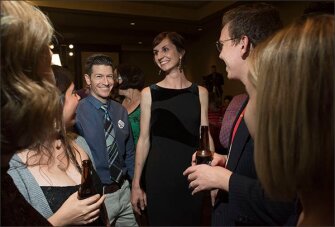Phoenix
David Garcia, a Democratic college of education professor who galvanized teachers, school administrators, and parents behind an ambitious bid to pump more than $1 billion back into Arizona’s public school system, lost Tuesday to incumbent Republican Gov. Doug Ducey in the race for Arizona governor.
It was a significant blow for public school advocates across the country who drew inspiration from the #redfored movement sparked here after thousands of teachers staged a week-long strike last spring over stagnant wages and stringent work conditions.
In the ballroom of the Renaissance Downtown Hotel in Phoenix on Tuesday night, shortly after hundreds of supporters decked in red chanted “Red for Ed,” Garcia told teachers, “You will not go back to your classrooms with your heads down. You will keep up this fight.”

Garcia, who lost his 2014 bid to become the state’s superintendent by just a few hundred votes, shocked pollsters when he beat state Sen. Steve Farley, a more moderate Democrat committed to not raising the state’s taxes, in the Democratic gubernatorial primary.
But Ducey significantly outspent Garcia, bragged about the state’s surging economy, and told voters Garcia would only raise the state’s taxes to spend on failing schools, anathema in this Libertarian state.
Arizona’s large coalition of public school advocates must now find a way to repair its relationship with Ducey and the state’s legislature. During the campaign, Ducey described teachers as money-hungry activists who only want to raise the average citizen’s taxes.
After the strike last spring, Ducey provided teachers with a 10 percent pay raise and said teachers would get a 20 percent pay raise by 2020. But teachers were largely skeptical.
“Ducey is full of lies,” Porche Allah, a 7th grade science teacher at Greenfield Elementary in Phoenix said at Tuesday night’s watch party for Garcia.“There’s so much dishonesty in the state capitol. I don’t trust any of them.”

Ducey promised on the campaign trail to devote “more money, over and above inflation, every year I am governor,” but avoided specifying a certain amount. Notably, in his first bid for governor in 2014, Ducey promised to cut taxes every year he was in office. Those tax cuts are now being blamed for the overcrowded classrooms and low teacher pay.
While the state’s economy is surging, Arizona’s property values, which plummeted during the Great Recession and which schools are dependent on for tax revenue, have been slow to rebound. Meanwhile, the state’s student enrollment has signficantly grown in the last decade, resulting in overcrowded classes and a statewide teacher shortage.

At an especially rowdy protest at the state capitol in April, teachers worried out loud if their movement would still resonate with voters come Election Day. But their energy remained high throughout this state’s scorching summer as hundreds of teachers canvassed, sent postcards and made personal phone calls to their neighbors to vote for Garcia.
When in August, the state supreme court knocked off the ballot a question that would’ve asked voters to raise taxes on the state’s wealthy in order to provide $690 million for public schools, teachers were furious.
“It was a slap in the face for us,” said Joseph Fuentes, a 3rd grade teacher at Garfield Elementary School, said Tuesday night. His message for state Republican leaders: “We did everything you asked us to do and you pulled that from right underneath us.”
The surge in support among parents across political lines surprised many teachers.
“We will take this fight to the next election,” said Courtney Kemp, an AP teacher at Chandler High School. “This taught us that we have a voice. We can make a change.”






